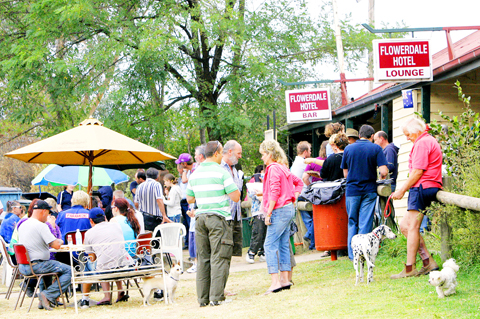Outside the town pub where a light rain is instantly sucked up by the fire-scorched earth, the people of Flowerdale are planning a resurrection.
The materials are ready for a village of portable homes. The kindergarten children whose school burned are playing at the community center. The hungry get hot meals and cold drinks.
Two weeks have passed since wildfires swept southern Australia, killing at least 209 people and leaving 7,500 homeless. Most survivors are just beginning the long process of getting government aid to rebuild.

PHOTO: AP
For the 1,500 residents of Flowerdale, where about 80 percent of the residents lost their homes and at least eight people died, waiting to be rescued would not do. So they decided to save themselves.
“We’re not gonna stand still — we never have,” said Steve Phelan, owner of the town pub, the Flowerdale Hotel — one of the few buildings left standing in this blackened wasteland. “We just got out of bed and we got up and got going.”
In towns across Australia, the pub is the social center. In Flowerdale, it has become the survival center. It was a refuge for dozens who huddled inside its wooden walls as fires bore down on the village. And it was a gathering spot for shaken survivors the morning after the Feb. 7 inferno.
It was at the pub, too, where the people realized help from outsiders would not come quickly. If the town had any hope of a future, resident John Burgess said, the people needed a reason to stay.
And so they appointed a council and named Burgess the town spokesman. Every day at 9am, survivors gather around the pub’s picnic tables and set to work. A plan for a temporary village of portable homes was quickly drafted. A cluster of tents was erected for those who had no place else to go.
Everyone was given a job. Teachers and volunteers went to the community center to watch children who no longer had a school.
Residents worked their contacts and got donations of food, water, clothes and construction materials. Some focused on arranging meetings with officials who could help restore essential services and send in supplies.
In one neighborhood tucked between fire-scarred hills, just two houses out of 40 still stand and a purple swing set is the lone spot of color in a sea of black, brown and gray. All is quiet, but for the rustling of charred leaves and the squeak of a decorative metal windmill, warped by heat, but still turning.
There are sounds of progress. Trucks toting away the wreckage rumble down the road. A wood chipper whines as dead trees are collected and fed into its jaws. A telephone line repairman chats with visitors as he twists wires this way and that.
On Friday, the first portable home was ready to go up in a field next to the community center. A development of 50 is planned, complete with running water and power, streetlights and exercise areas, Burgess said. How it will be funded has not been fully determined, he said, but much of the material has already arrived.
“There’s just not a model that says ‘this is what we do after having a bush fire that wrecks the town,’” he said. “We’d like to think that we’ve got forward thinking here — that we’re building that model now.”
Lyn Gunter, mayor of Murrindindi Shire, where Flowerdale is located, said it was important to give the residents control and not dictate what they should do.
“They need to be where they are comfortable, where they are safe,” Gunter said. “I don’t think any of us would have thought this would happen so quickly, but it shows the community spirit behind all of this.”
Flowerdale resident Debbie Bourke stopped by the pub for the morning meeting and picked up some new pink pajamas for her four-year-old daughter, Shawnee. The family is living in a tent and the children stay warm at night in their sleeping bags. She said the tenacity of Flowerdale’s people gives her hope.
“You can’t knock Flowerdale. They won’t get us off our hill,” she said. “We’ll stay and we’ll rebuild, even if we have to do it one house at a time. It’ll all come back.”

Nauru has started selling passports to fund climate action, but is so far struggling to attract new citizens to the low-lying, largely barren island in the Pacific Ocean. Nauru, one of the world’s smallest nations, has a novel plan to fund its fight against climate change by selling so-called “Golden Passports.” Selling for US$105,000 each, Nauru plans to drum up more than US$5 million in the first year of the “climate resilience citizenship” program. Almost six months after the scheme opened in February, Nauru has so far approved just six applications — covering two families and four individuals. Despite the slow start —

North Korean troops have started removing propaganda loudspeakers used to blare unsettling noises along the border, South Korea’s military said on Saturday, days after Seoul’s new administration dismantled ones on its side of the frontier. The two countries had already halted propaganda broadcasts along the demilitarized zone, Seoul’s military said in June after the election of South Korean President Lee Jae-myung, who is seeking to ease tensions with Pyongyang. The South Korean Ministry of National Defense on Monday last week said it had begun removing loudspeakers from its side of the border as “a practical measure aimed at helping ease

DEADLY TASTE TEST: Erin Patterson tried to kill her estranged husband three times, police said in one of the major claims not heard during her initial trial Australia’s recently convicted mushroom murderer also tried to poison her husband with bolognese pasta and chicken korma curry, according to testimony aired yesterday after a suppression order lapsed. Home cook Erin Patterson was found guilty last month of murdering her husband’s parents and elderly aunt in 2023, lacing their beef Wellington lunch with lethal death cap mushrooms. A series of potentially damning allegations about Patterson’s behavior in the lead-up to the meal were withheld from the jury to give the mother-of-two a fair trial. Supreme Court Justice Christopher Beale yesterday rejected an application to keep these allegations secret. Patterson tried to kill her

CORRUPTION PROBE: ‘I apologize for causing concern to the people, even though I am someone insignificant,’ Kim Keon-hee said ahead of questioning by prosecutors The wife of South Korea’s ousted former president Yoon Suk-yeol yesterday was questioned by a special prosecutor as investigators expanded a probe into suspicions of stock manipulation, bribery and interference in political party nominations. The investigation into Kim Keon-hee is one of three separate special prosecutor probes launched by the government targeting the presidency of Yoon, who was removed from office in April and rearrested last month over his brief imposition of martial law on Dec. 3 last year. The incident came during a seemingly routine standoff with the opposition, who he described as “anti-state” forces abusing their legislative majority to obstruct